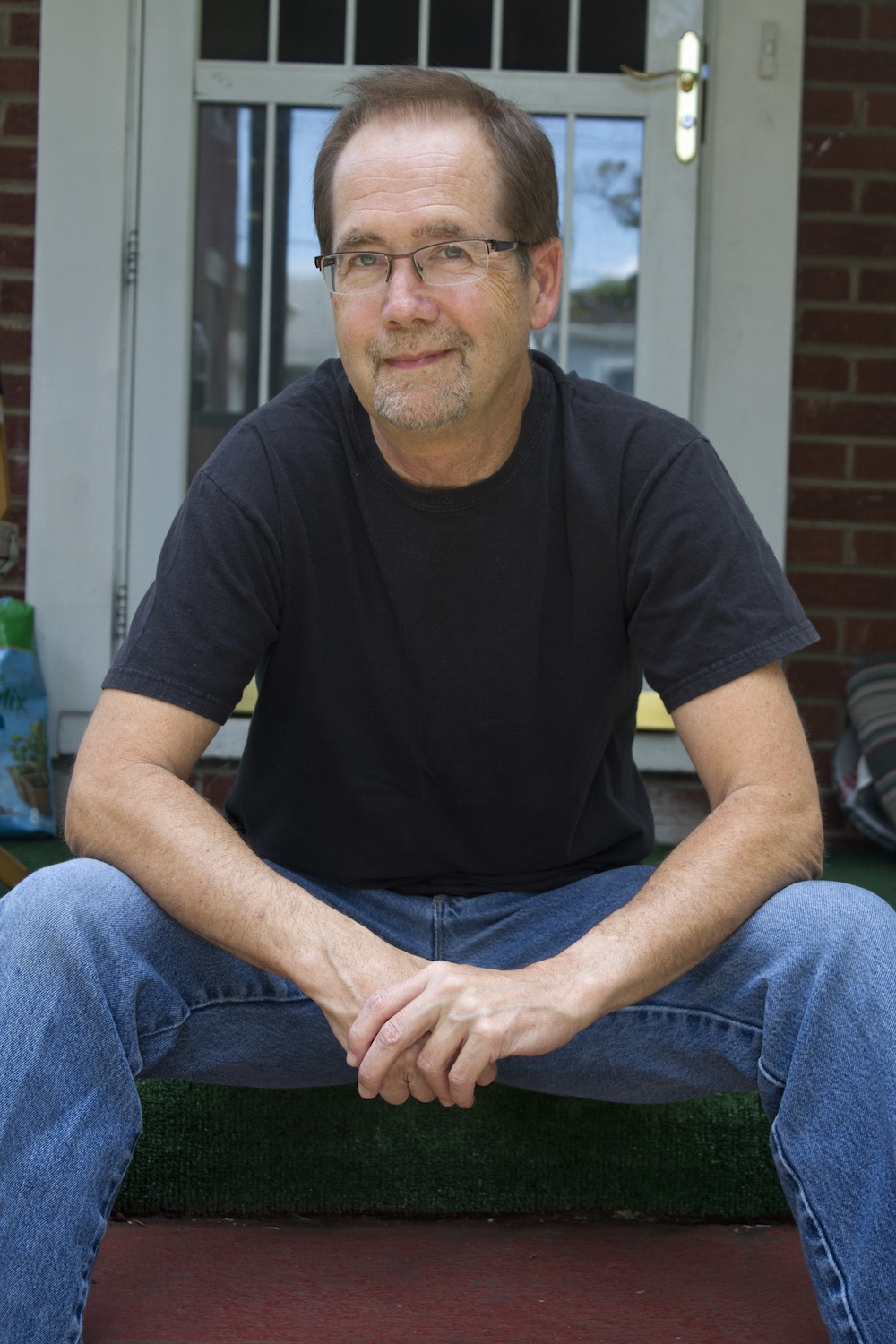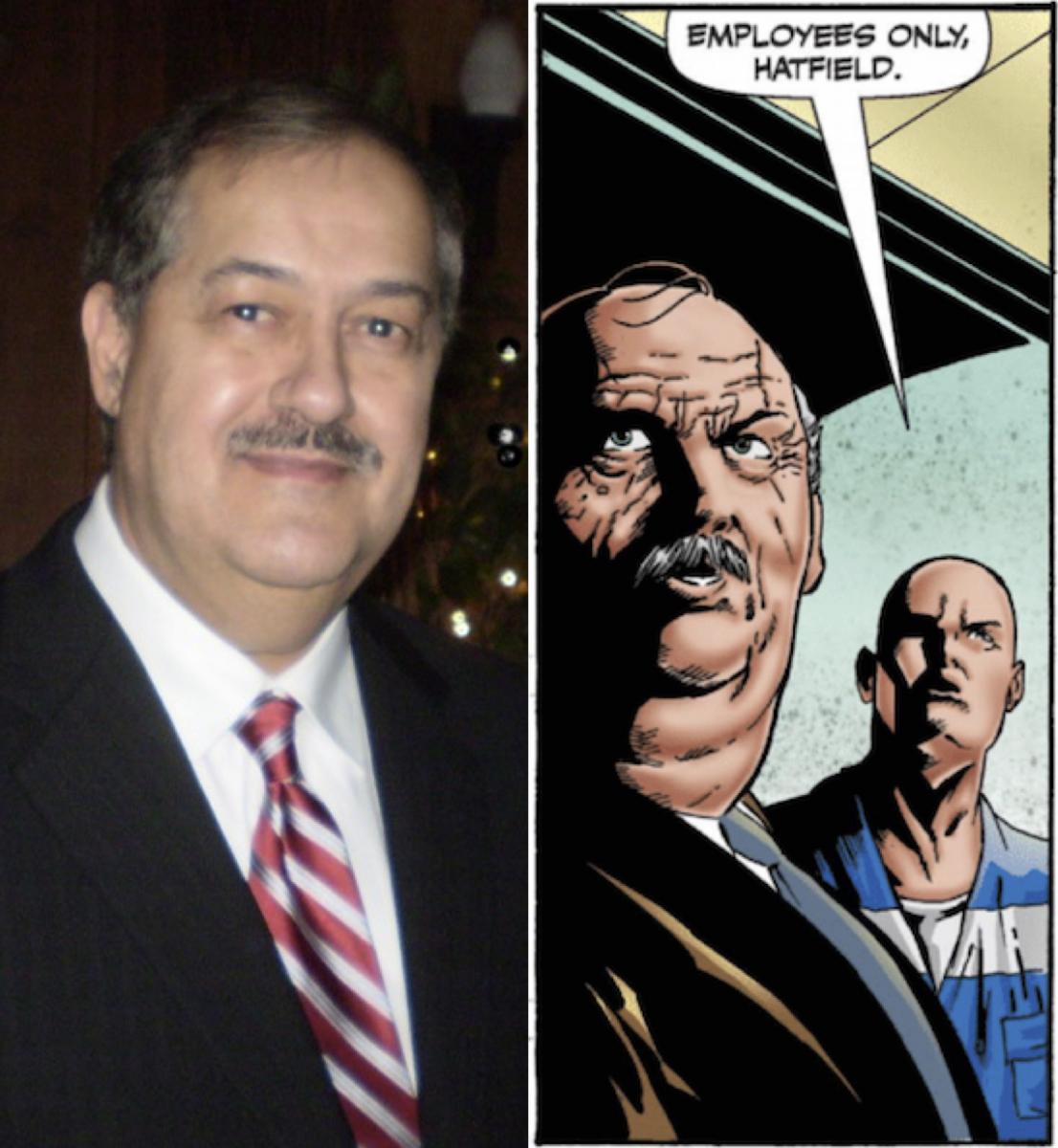Graphic novelist draws a bead on disgraced coal baron, Senate hopeful Blankenship

Daniel Boyd's graphic novel "Carbon" features an archvillain based on former Massey Energy CEO Don Blankenship, who just completed a prison sentence for his role in the deadly Upper Big Branch Mine disaster tand who is now planning to run to represent West Virginia in the U.S. Senate. (Photo courtesy of Daniel Boyd.)
Don Blankenship announced last week that he is running in 2018 as a Republican for West Virginia's U.S. Senate seat currently occupied by Democrat Joe Manchin. But Blankenship, the former CEO of coal company Massey Energy, faces a big obstacle: He's not allowed to leave the state of Nevada until next May without the permission of a probation officer or federal judge.
That's because he's on probation after a one-year stint in jail for the misdemeanor of conspiring to violate mine safety laws after the 2010 Upper Big Branch Mine disaster in which 29 miners were killed. But don't expect any mea culpas from a reformed Blankenship: While in prison, he mailed to people across West Virginia a 67-page manifesto called "American Political Prisoner" in which he claimed he was the fall guy for the Mine and Safety Health Administration's (MSHA) failure to provide proper oversight and said his conviction was political persecution by Manchin and President Obama.
Once dubbed "the Dark Lord of Coal Country" by Rolling Stone magazine, Blankenship is a standout even in the villainous world of coal bosses. In fact, it's no coincidence that Blankenship bears striking similarities to the fictional villain in the 2014 graphic novel "Carbon," described by filmmaker John Sayles as an "eco-horror Old Testament tale" written by West Virginia native and retired West Virginia State University media studies professor Daniel Boyd and illustrated by Brazilian artist Edi Guedes.
Boyd is an acclaimed filmmaker whose wide-ranging credits include the cult horror movie "Chillers" and a series of archaeological documentaries, two of which were nominated for regional Emmys. His first job was at Southern West Virginia Community College in Mingo County, deep in the heart of coal country, which piqued his interest in making a movie about the lives of coal miners. (The foreword to "Carbon" was written by Sayles, director of the critically lauded 1987 film "Matewan" about a bloody 1920 coal miner's strike in West Virginia.) But Boyd's dream ran into financial roadblocks.
"As a filmmaker, I never was able to work into that budget level," Boyd says. "But when I fell into graphic narrative and comics five or six years ago, I thought, ‘Well, that's the perfect venue.'"
In the book, an evil coal company executive inspired by Blankenship by the name of Rod Dickenson sends workers down into a mineshaft full of ancient monsters called "Sheves" to find a liquified form of coal that burns forever. Dickenson eventually meets his end in a spectacular fashion when the protagonist throws a rock at his head and knocks him out of a helicopter and into a coal slurry flood and the waiting clutches of a Sheve.
With the news that Blankenship was running for the U.S. Senate, Facing South reached out to Boyd to get his thoughts on the coal baron's political aspirations in a state that went for Donald Trump by 42 points and on the same day elected as governor Jim Justice, a coal company owner who also has a bad record on mine safety. This interview has been edited for length and clarity.
Do you think Blankenship has a chance of winning?
Oh, no. No. He's got a bunch of money, but he doesn't have that much money … It's almost like a sociopathological thing, man. He needs to prove something, and he's using Sen. Manchin as the foil for some reason, to focus on, when there's a whole lot of other people and legal systems.
We're all scratching our heads, but my guess is it's for the platform. Every time you turn on TV here, one of his commercials is on, even before he was running. So he spends a few bucks to file for the office, and then has even more of an excuse to run his dumb-ass commercials.
If you had to guess his real reason for running, would you say it's self-promotion, or attacking Manchin, or trying to change public opinion about himself or what?
All of the above. I think he's trying to vindicate himself after his conviction. The biggest shock for us is that he only got a year [in prison].
He sent this book out. I've got it here. He mailed it to everyone — "American Political Prisoner." It's like a manifesto of crazy.

When you started writing the character Dickenson, did you have Blankenship in mind, or were the similarities something you realized after?
I had to have a super villain for that mythological approach that I took. But Blankenship, that was like shooting fish in the barrel. It was too easy. I did not write the part for him — I had a story structure that I was using, I needed a super antagonist, a super villain, and he just made it easy.
Last year, West Virginia went for Trump by a huge margin and elected Justice as governor. Why do you think people in a state that's struggling as much as West Virginia are turning to these very wealthy guys for help and support?
I think it's rebellion, really. The people of West Virginia have never wanted people to tell them what to do. And there are serious economic issues here, and sometimes people just need something to blame, you know? And unfortunately, with our recent elections, they're blaming the wrong people. They're buying the smoke and mirrors of the so-called "War on Coal."
Since Trump and Justice have gotten elected, has there been an uptick in quality of life for people?
Our revenues are up, actually, after they tanked last year. And they are selling more coal, it's actually happening. I don't hear anyone telling me this — I see it when I read the Charleston Gazette-Mail each morning. So, on paper it looks like there are some improvements. But quality of life? I don't know.
What do you think needs to happen to turn things around for West Virginia and shift away from coal to a more diverse economy?
Force a diverse economy. Anyone that opens the news sees that there are a thousand times more renewable [energy] jobs than [in] the extraction industry. We lost the wave on that. We're an energy state and we were dealt a bad hand, because it turns out our biggest natural resource destroys the environment. But that was the time to get out ahead of this.
But the industry resisted it. They resisted any kind of stimulus package, anything to transition, through smoke and mirrors. Watch the left hand saying "War on coal" but the right hand, "We know it's done." The industry knows it's done, but they want to work it until they can go out the back door. Change has to come. Coal's not coming back, and these false promises for people, they're still hanging onto that.
We've got the people. We have the most wonderful people in the world here. I don't know the answer, but it's going to be forced upon us. [West Virginians] are already starting to see through the lies of Trump. What's he's promising isn't coming.
Tags
Paul Blest
Paul Blest is a contributing writer for Facing South. He is also a contributing writer for the Outline and has written for The Nation and Current Affairs. He lives in Raleigh, North Carolina.
